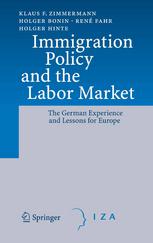

Most ebook files are in PDF format, so you can easily read them using various software such as Foxit Reader or directly on the Google Chrome browser.
Some ebook files are released by publishers in other formats such as .awz, .mobi, .epub, .fb2, etc. You may need to install specific software to read these formats on mobile/PC, such as Calibre.
Please read the tutorial at this link: https://ebookbell.com/faq
We offer FREE conversion to the popular formats you request; however, this may take some time. Therefore, right after payment, please email us, and we will try to provide the service as quickly as possible.
For some exceptional file formats or broken links (if any), please refrain from opening any disputes. Instead, email us first, and we will try to assist within a maximum of 6 hours.
EbookBell Team

4.4
42 reviewsGerman and European immigration policies have only recently begun to cope with the inevitable: growing labor demand in the face of high unemployment and a shrinking labor force due to demographic change. Despite the implementation of Germany's first immigration act and several European initiatives towards legal harmonization at the EU level, an actively controlling immigration policy, which would be needed to master the challenges ahead, is not yet in sight. Against this background, the book draws conclusions from the German history of immigration policy. It analyzes the country's future demand for immigration and develops an economic model for the effective selection and integration of labor migrants that could provide the foundation for a joint European immigration strategy.
"Western Europe, and in particular Germany, have come to realize that they are regions of substantial net immigration. This book develops prospects for future trends in German and European immigration policies. It is an essential input into any serious public policy discussion of European immigration issues."
Barry Chiswick, University of Illinois at Chicago, leading US immigration expert
"Legal migration should be managed rather than endured. To show policy makers and citizens under which circumstances legal migration can be beneficial, research is needed and puzzles need to be solved. Which criteria should be applied? What can we learn from traditional migration countries? What role is there for Europe? This book is a valuable contribution to these pertinent questions."
Marcel Canoy, Bureau of European Policy Advisers, Directorate General of the European Commission